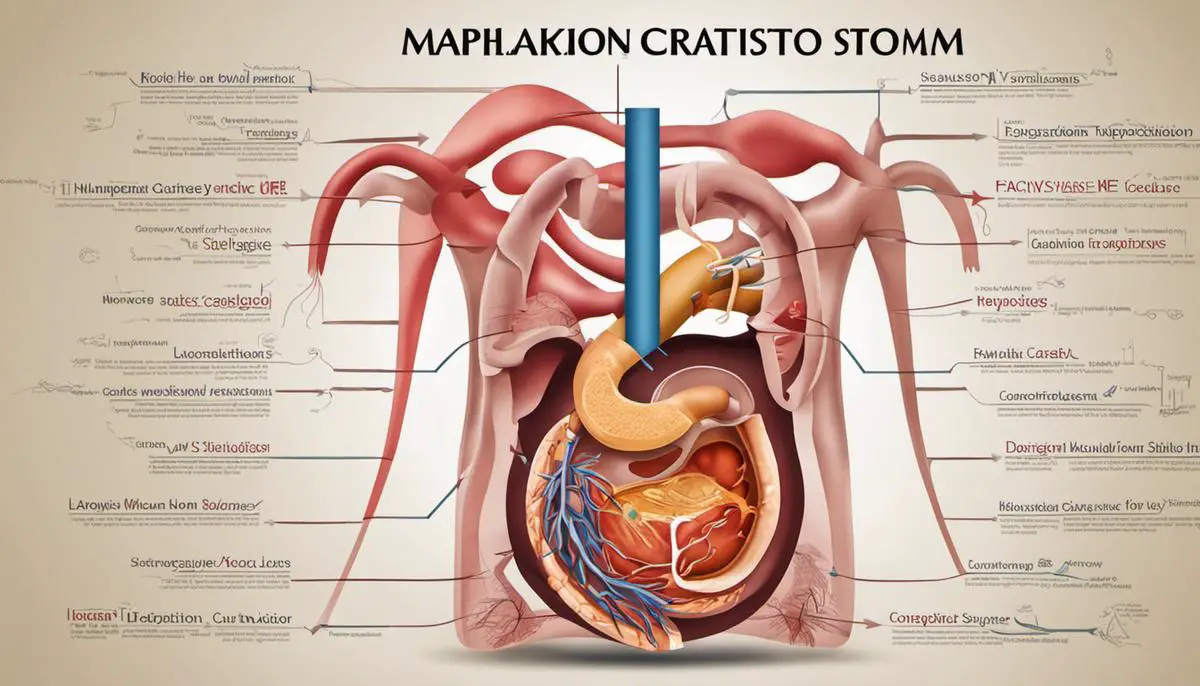Constipation, a common yet often disregarded health concern, impacts millions worldwide. Its unsettling symptoms yield discomfort, affecting the overall quality of life. This condition stems from diverse causes and portrays various symptoms, making an informed understanding cardinal to its effective management and prevention. The concepts of natural alternatives to combat constipation, deciphering the varied range of over-the-counter remedies available, and the integral role of lifestyle modifications for its prevention serve as noteworthy pillars in achieving this goal. As this discourse commences, let the exploration begin on the quest of understanding constipation and its remedies.
Understanding Constipation
Understanding Constipation
Constipation refers to bowel movements that are infrequent or hard to pass. Typically, if you’re experiencing fewer than three bowel movements each week and the stools are hard or dry, you may be suffering from this condition. It’s a common issue in the United States, with estimates suggesting it affects around 15% of adults.
Symptoms of Constipation
Aside from infrequent bowel movements, symptoms of constipation can include feeling bloated, discomfort in the abdomen, and the sensation of a blockage in your bowel or rectum. Painful bowel movements and having to manually remove stool from your rectum are also symptoms, although they are less common.
Causes of Constipation
Constipation generally occurs when waste or stool moves too slowly through the digestive tract, leading to hard or dry feces. This can be triggered by a number of factors. For instance, lack of fiber in the diet, not drinking enough water or fluid dehydration, and a lack of physical activity could lead to constipation. Equally, certain medications, pregnancy, aging, and certain diseases can significantly slow the passage of stool and cause constipation.
How It Affects Your Digestive System
Constipation affects your digestive system by slowing the transit of waste material. This leads to increased time in the colon, which can result in excess water removal, leading to hard and dry stools. Chronic constipation can also strain your digestive system and potentially lead to other complications like hemorrhoids or anal fissures.
Common Misconceptions about Constipation
There are many misconceptions about constipation, one of the most common being that you must have a bowel movement every day. In reality, everyone’s body is different and not everyone will have a bowel movement daily. Another misconception is that constipation can lead to the body absorbing poisonous substances from stools. However, constipation itself does not cause the body to absorb toxins any more than when bowel movements occur regularly.
Basic Medical Explanations
Medically, constipation is usually defined as having fewer than three bowel movements a week, although variations can occur depending on individual bodies and diets. While it’s common for constipation to be a temporary condition, sometimes constipation can become chronic, lasting several weeks or longer. This could indicate a functional disorder in your digestive system, such as irritable bowel syndrome or diverticulosis, or might even indicate a blockage or cancer.
Remedies and Lifestyle Changes
Implementation of certain changes in daily living habits can often alleviate constipation. These may include increasing physical activity, drinking more fluids, and incorporating more fiber-rich foods into your diet. Over-the-counter fiber supplements can also ease constipation, and in some cases, a doctor might prescribe medications to help stool pass more easily.

Natural Constipation Remedies
Understanding Constipation and its Causes
Constipation is a common digestive issue that affects people of all ages. It is characterized by infrequent bowel movements, difficulty in passing stool, or feeling like you haven’t completely emptied your bowels. Some of the primary causes of constipation include a poor diet, insufficient fluid intake, lack of physical activity, and in some cases, underlying medical conditions.
Dietary Adjustments for Relief from Constipation
Your diet plays a crucial role in maintaining healthy bowel movements. Consuming a high-fiber diet can considerably alleviate constipation. Foods rich in fiber include whole grains, vegetables, fruits, beans, and legumes. Incorporating these into your meals can promote regular bowel movements. It’s also advisable to limit the consumption of processed foods and refined carbohydrates, as they can contribute to constipation.
Hydration for Ease in Bowel Movements
Staying well-hydrated is fundamental for a healthy digestive system. Dehydration can lead to hardened stools which may result in constipation. Drinking plenty of fluids, primarily water, facilitates the passage of waste through your digestive system. Including high water content fruits and vegetables like watermelon, oranges, cucumbers, and tomatoes in your diet can also contribute to hydration.
Physical Activity and Bowel Health
Physical activity helps improve digestion by decreasing the time your body takes to move food through the large intestine. Engaging in regular exercises like walking, cycling, swimming, or even simple stretches can stimulate your intestines and relieve constipation.
Specific Foods for Constipation Relief
Certain fruits, vegetables, and herbs are known for their natural laxative properties. Prunes are rich in dietary fiber and contain sorbitol, a natural carbohydrate that softens the stool. Kiwi, pears, and berries are also excellent choices for their high fiber content. Vegetables like spinach, broccoli, and brussels sprouts can enhance bowel movements. Herbs like aloe vera, ginger, and fennel can serve as helpful natural remedies for constipation too.
Also, incorporating probiotic foods into your diet like yogurt, kefir, or fermented foods can promote a healthier gut by increasing the beneficial bacteria.
Preventive Measures and Consultation
While these natural remedies can alleviate constipation to an extent, it is essential also to adopt lifestyle modifications such as regular exercise, staying hydrated, and consuming a balanced diet. If your constipation persists, it’s crucial to seek medical advice. Chronic constipation can be a sign of a serious underlying condition, requiring professional medical intervention.

Over-the-counter Constipation Remedies
Understanding Over-the-Counter Constipation Remedies
Over-the-Counter (OTC) constipation remedies are medications available without a prescription to help relieve constipation symptoms. These can be effective in providing short-term relief and are generally safe when used appropriately.
Types of OTC Constipation Remedies
There are several types of OTC constipation remedies available, each working differently within your body. These include fiber supplements, osmotic agents, stool softeners, and stimulant laxatives.
Fiber supplements such as psyllium (Metamucil) and methylcellulose (Citrucel) work by adding bulk to your stool, which helps it pass more easily. Osmotic agents, like polyethylene glycol (Miralax) or Milk of Magnesia, draw water into your intestines to soften stools and make them easier to pass.
Stool softeners such as docusate sodium (Colace) work by increasing the amount of water the stool absorbs in the gut, making the stool softer and easier to pass. Stimulant laxatives, like Bisacodyl (Dulcolax), cause your intestines to contract, moving the stools out.
Using OTC Constipation Remedies
Use these medications as directed by the manufacturer or healthcare professional. Start with the lowest dose and gradually increase, if necessary, until you find a dosage that works best for you. Do not use these products for more than a week unless directed by your doctor, as prolonged use can lead to dependency or worsen constipation.
Side Effects and Precautions
Most OTC constipation remedies are safe when used as directed and deliver minimal side effects. However, side effects can manifest, depending on the type of medication used. These may include bloating, gas, cramping, or increased thirst. Overuse of certain laxatives can lead to an electrolyte imbalance or dehydration.
Before taking OTC constipation remedies, it’s crucial to consult with a healthcare professional if you have an existing health condition, are pregnant or nursing, or are taking other medications, as there can be interactions.
When to Seek Medical Advice
It’s important to consult with a doctor if your constipation is chronic, severe, or associated with other concerning symptoms such as abdominal pain, blood in stool, unintentional weight loss, or changes in the color or size of your stool. These could be signs of a more serious underlying condition, such as colorectal cancer, that needs medical attention. Additionally, if an OTC remedy hasn’t improved your condition after one week of use, seek medical advice.

Prevention of Constipation
Understanding the Importance of Dietary Choices in Preventing Constipation
A key factor in preventing constipation is the choice of diet. A diet that is high in fiber can greatly decrease the chances of constipation. Consuming plenty of fruits, vegetables, and whole grains can contribute to maintaining a healthy digestive system. For example, prunes and pears are known for their high fiber content. Including these in your daily diet can create a noticeable difference in your bowel movement regularity. Moreover, staying well hydrated by drinking an ample amount of water each day also helps soften the stool and ease the bowel movements.
The Significance of Regular Physical Exercise
In addition to diet, regular physical exercise can stimulate your intestines and speed up the digestive process, reducing the possibility of constipation. For individuals suffering from chronic constipation, a brisk walk or jog of 30 minutes every day can greatly aid in the facilitation of regular bowel movements. Other exercises such as yoga and Pilates that involve a lot of stretching and bending can also help enhance the movement of stool through the digestive system.
Common Habits Leading to Constipation and Tips to Avoid Them
There are several common habits that can lead to constipation. Ignoring the urgency to have a bowel movement can contribute to constipation over time. It’s important to respond to your body’s signals and take time for bowel movements when needed. Additionally, a low-fiber diet, inadequate fluid intake, and a lack of physical activity can also contribute to constipation. Avoiding these habits by maintaining a regular eating schedule, drinking adequate amounts of water, and keeping active can help in reducing the risk of constipation.
The Connection Between Stress Management and Constipation
There is a clear link between stress and constipation. High levels of stress can disrupt the normal functioning of the digestive system and lead to constipation. Therefore, managing stress levels through practices like meditation, deep breathing, or any other form of relaxation can be beneficial. Along with maintaining a healthy lifestyle, ensuring you get enough sleep can also significantly influence the smooth functioning of the digestive system and help in preventing constipation.
In summary, a healthy diet, regular exercise, smart habits, and stress management practices can all play a part in preventing constipation. By taking a holistic approach to your lifestyle habits, you can effectively manage and prevent constipation.

In a world that is continually on the move, health often takes a backseat, and ailments like constipation gain ground. Thus, understanding the role of diet, remaining fluid-hydrated, engaging in physical activity, and comprehending the pros and cons of over-the-counter drugs is integral. Not resting solely on quick-fix medications but focusing on the prevention of constipation paves the way for a healthier lifestyle. Embracing preventive measures: making informed decisions and lifestyle modifications aid the healthy functioning of the digestive system, contributing significantly to overall wellness. After all, a journey to better health begins with one small step towards change.
